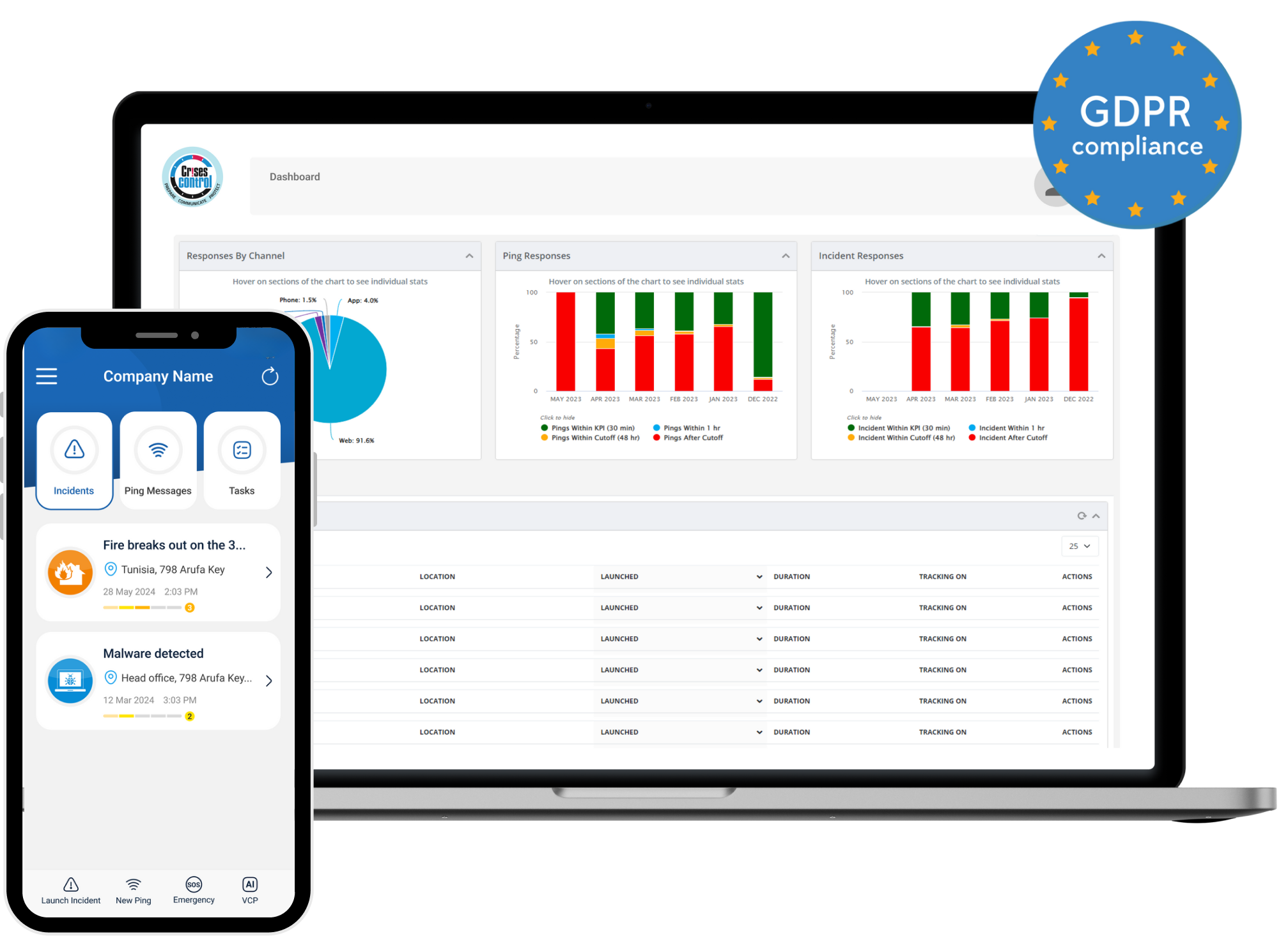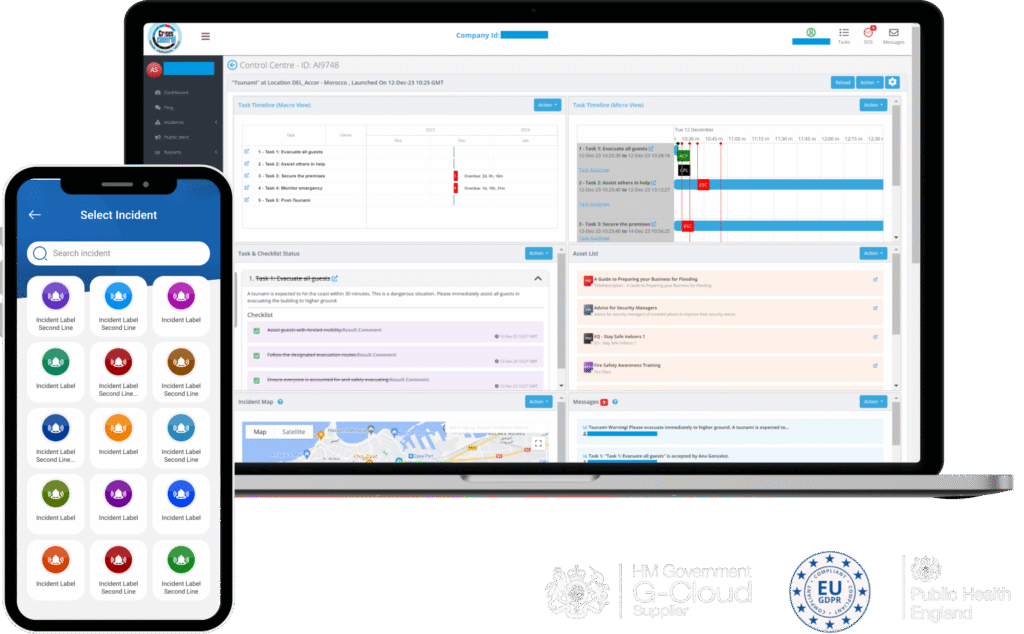GDPR Business Continuity Compliance Software

Stay Ahead of the Game with GDPR Business Continuity Compliance
With the increasing threat of cyber-attacks and data breaches, organisations need to prioritise GDPR business continuity compliance to protect their business and clients’ sensitive information. The European Union’s General Data Protection Regulation (GDPR) sets out strict requirements for businesses to ensure the confidentiality, integrity, and availability of personal data.
Crises Control offers a comprehensive solution to help organisations stay ahead of the game with GDPR business continuity compliance. Our software provides the necessary tools and resources to meet the requirements of the GDPR, reducing the risk of data breaches, protecting your business, and avoiding costly fines from regulators.
The Essential Tools for GDPR Business Continuity Compliance
Crises Control is designed with the essential tools necessary to meet the requirements of the GDPR. Our GDPR business continuity compliance software includes incident management capabilities, communication tools, and reporting functions, making it easier for organisations to maintain compliance and protect their clients’ sensitive information.
In the event of a data breach, our incident management module helps organisations respond quickly, reducing the risk of further damage and minimising recovery time.
Our GDPR business continuity compliance tools allow for secure and reliable messaging, ensuring the confidentiality of personal data.
Streamline Your GDPR Business Continuity Compliance Process
With Crises Control, organisations can streamline their GDPR business continuity compliance process, saving time and resources. Our software provides a centralised platform for managing incidents, monitoring compliance, and reporting data breaches. This allows organisations to keep track of their GDPR obligations and maintain a positive reputation.
In addition, Crises Control offers training and support, ensuring that organisations are fully equipped with the knowledge and skills needed to maintain GDPR business continuity compliance. Our team of experts is available to provide guidance and support, ensuring that your organisation is always one step ahead.

Confidentiality, Integrity, Availability, Resilience with GDPR Business Continuity Compliance Software
Where the three principles of information security are CIA, or confidentiality, integrity, and availability, the GDPR places a fourth responsibility on you when it comes to protecting information – resilience.
Resilience means having the capacity to recover quickly from any form of information privacy breach. It can include business continuity plans, disaster recovery processes, or cybercrime defences, all of which will set out the actions you need to perform in order to recover as quickly as possible.
The Crises Control incident manager enables you to create, test, execute, audit, and review your information security and cyber crime business continuity plans.


The Crises Control and GDPR
- Data mapping and inventory: Crises Control allows you to create an inventory of all the personal data you hold, where it came from, and who it is shared with. This is a key requirement of the GDPR, as it enables you to identify and mitigate any risks associated with the data you hold.
- Risk assessment: The platform includes a built-in risk assessment tool that helps you identify and evaluate the risks associated with your personal data. This allows you to take appropriate measures to protect it and comply with the GDPR.
- Incident management: In the event of a data breach or other incident, Crises Control provides a step-by-step incident management process to help you respond quickly and effectively. This includes guidance on how to notify the relevant authorities and affected individuals, as required by the GDPR.
- Documentation and reporting: Crises Control allows you to easily create and maintain records of your data protection activities, including your data inventory, risk assessments, and incident management process. This helps you demonstrate compliance with the GDPR and provide the necessary documentation to regulators.
Overall, Crises Control provides a comprehensive solution that covers all the key areas of GDPR compliance, making it easy for organisations to meet their obligations under the regulation.
Incident Templates
Ready to use GDPR business continuity compliance focused templates, covering scenarios including: cyber attack, data loss/ theft, data loss protection, subject access request, and more.
Incident Task Tracking
Ability to predefine critical tasks with owners and time limits, and task progress tracking to ensure they are completed. Automated escalation for tasks that are not completed on time.
Command & Control Dashboard for Incident Managers
Crises Control offers a powerful command and control dashboard that provides real-time visibility into all aspects of incident response. This includes issues, locations, tasks, response teams, and more. The dashboard serves as the central hub for managing and coordinating incident response, both during and after an incident. With this feature, organisations can quickly and easily identify and address any issues that arise, ensuring that incidents are handled effectively and efficiently. This feature can help incident managers to have a 360 degree view of the all activities and thus minimise damage and downtime, maintain a positive reputation.
Reports and Audit Trail
Crises Control provides a secure and comprehensive platform that includes a robust reporting and audit trail feature. This feature ensures that every notification, communication, task, or action is recorded and logged with timestamps, responses, and performance metrics. This allows for complete transparency and accountability for all activities performed within the platform. This feature provides valuable insights for post-incident improvement and audits, ensuring that all incidents are handled effectively and efficiently. It also helps organisations to demonstrate compliance with regulations such as GDPR.
FAQs
The General Data Protection Regulation (GDPR) is a comprehensive data protection law that was introduced by the European Union (EU) and came into effect on May 25, 2018. It is designed to protect the privacy and personal data of individuals residing in the EU.
In the context of the UK, the GDPR continues to apply despite the UK's departure from the EU. However, after Brexit, the UK has its own version of the GDPR called the UK GDPR, which is essentially the same as the EU GDPR with some minor modifications to make it suitable for the UK legal framework. The UK GDPR ensures that data protection standards remain consistent in the UK and align with the EU's standards to facilitate data transfers between the UK and EU member states.
Under the UK GDPR, individuals have certain rights regarding their personal data, such as the right to access their data, the right to rectify any inaccuracies, the right to have their data erased, and the right to object to or restrict the processing of their data. It also places obligations on organisations that process personal data, requiring them to handle it securely and responsibly.
The UK GDPR is enforced by the Information Commissioner's Office (ICO), which is the UK's independent authority for promoting and enforcing data protection laws. The ICO has the power to investigate data breaches, issue fines, and take other regulatory actions to ensure compliance with the UK GDPR.
Crises Control is a software platform designed to assist organisations in managing and responding to various crises, including data breaches and other incidents that may impact data protection and privacy. Some general ways in which such a platform could help with GDPR compliance:
- Data Breach Management:- In the event of a data breach, Crises Control can help with the management and coordination of response activities. This may include features for documenting and tracking breach details, facilitating communication with affected individuals and regulatory authorities, and managing legal and regulatory obligations, such as breach notification requirements under the GDPR.
- Data Protection Impact Assessments (DPIAs):- Crises Control might offer functionalities to conduct and document DPIAs. DPIAs are assessments carried out to identify and minimize data protection risks associated with processing activities. The software can assist in creating templates, conducting risk assessments, and documenting mitigation measures to ensure compliance with GDPR's requirements.
- Subject Access Request (SAR):- The software can assist in creating SAR templates, automating the process conducting time critical tasks, documenting the replies received and maintain process audit to ensure compliance with UK and EU GDPR's requirements.
- Documentation Management and Compliance Tracking:- Crises Control provides a cloud based document management system with tools for assigning document owners, automating reminders for review and tracking for compliance efforts. This might include maintaining records of processing activities, data protection policies and procedures, consent management, and data subject rights management, which are all essential elements of GDPR compliance.
- Training and Awareness:- The software can offer features to deliver training materials and awareness campaigns to educate employees on data protection best practices and GDPR requirements. This can help raise awareness and foster a privacy-conscious culture within the organisation.
Yes, Crises Control's offer comprehensive reporting and analytics features that allow organisations to track compliance with GDPR and compliance related to ISO 27001, ISO 22301 and ISO 90001.
The audit data can also be exported to CSV and XLS format for further analysis.
Crises Control operates in various regions, including the UK, EEC (European Economic Area), Saudi Arabia, UAE, and Oman. To comply with local data protection laws, the Crises Control solution is designed to adhere to the specific regulations of each region. One key aspect of compliance is ensuring that data remains within the respective region and does not leave its boundaries.
In the UK, Crises Control ensures compliance with the UK GDPR, which is the local adaptation of the European Union's GDPR after Brexit. This means that personal data is handled according to the UK's data protection standards, and any data processed by the software remains within the UK region.
For the EEC region, which consists of EU member states and EEA countries, Crises Control complies with the EU GDPR. The solution ensures that personal data processed in this region remains within the EEC boundaries, in accordance with the GDPR's data transfer requirements.
In Saudi Arabia, UAE, and Oman, Crises Control aligns with the specific data protection laws and regulations of each country. The solution is designed to handle and process personal data within the boundaries of these regions, ensuring compliance with the respective local data protection frameworks.
To comply with USA data protection laws (after July 16, 2020, at which point the EU-U.S. Privacy Shield was invalidated by the Court of Justice of the European Union) we can offer alternative methods to ensure lawful data transfers from the UK to the U.S.
Here are some options to meet U.S. data protection laws:
- Standard Contractual Clauses (SCCs): Organisations can use SCCs, which are pre-approved contractual clauses issued by the European Commission, to govern data transfers from the UK to the U.S. SCCs establish data protection obligations and safeguards to ensure an adequate level of protection for the transferred data.
- Binding Corporate Rules (BCRs): BCRs are internal rules for multinational organisations that govern data transfers within the group of companies. Crises Control can establish BCRs to ensure compliant data transfers to U.S. entities within the same corporate group.
- Consent: If individuals provide explicit and informed consent for their personal data to be transferred to the UK for processing. The consent to be freely given, specific, informed, and unambiguous.
- Derogations: In certain limited circumstances, organisations may rely on derogations as outlined in the UK GDPR to transfer data to the U.S. These derogations include situations where the transfer is necessary for the performance of a contract, protection of vital interests, legal claims, or public interest.
Yes, Crises Control's privacy policy can be viewed at the foot of each website page.






